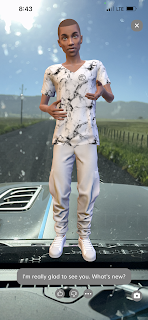In an era where every company is trying to navigate the complex world of generative AI, many leaders are still searching for the practical, day-to-day applications that truly move the needle. This is not another episode about the future potential of AI. This is a look at its practical present. Join us as we sit down with Ken Hubbell, a pioneering author and AI expert who has been at the forefront of the generative AI revolution since its early days. Ken pulls back the curtain on his career-long journey, sharing candid insights from his experiments, high-stakes projects, and the surprising ways he uses AI tools every day.
Kevin Benedict is a TCS futurist, humorist and lecturer focused on the signals and foresight that emerge as society, geopolitics, economies, science, technology, environment, and philosophy converge.
Breaking the Human Thinking Sound Barrier
 |
| Click to Enlarge |
The Modern Pilot: A Case Study in Cognitive Overload
Consider the evolution of military aviation. In World War I, pilots operated rudimentary aircraft with only a handful of gauges, their primary focus on navigation and observation. Fast forward to today, and modern fighter jets like the F-35 are so data-intensive that they are unflyable without AI assistance. These aircraft generate vast rivers of data through advanced sensors, requiring 8.6 million lines of code to process and present actionable insights to pilots. Even with highly optimized interfaces, pilots report struggling with information overload, forcing a redefinition of their role from flying the aircraft to managing a flying command center.
Harnessing the Power of AI
Enterprise AI with Inflection AI's Ted Shelton
Intelligence Transformation with Dr. Paul J. Bailo
Artificial Intelligence and Your Soul - An Interview with David Espindola
Futurist David Espindola’s new book has just been released, "Soulful: You in the Future of Artificial Intelligence." Alex Whittington and myself were fortunate to be able to interview him a couple of weeks back so we could share it with you today.
David doesn't shy away from the challenging topics of God, soul, purpose, Christianity, religions, and AI. I applaud him for sharing his perspectives and giving us much to contemplate.
GPT and the Consequences of Knowledge Friction
 |
GPT-4 is Even Better Than You Think
The Amazing Potential of a ChatGPT and Human Pairing
- Why did the Luddite start using social media? So he could complain about it.
- Why did the bioengineer create a new species of bacteria that can glow in the dark? To shed some light on the subject.
- When asked what he was working on the bioengineer answered, “I could tell you, but then I'd have to genetically modify you."
- How many Luddite farmers does it take to change a light bulb? None, they prefer candles.
- What do you get when you cross a Luddite with a Time Machine? A trip to the past no one wanted.
I have found that if you ask ChatGPT to write some generic jokes it fails. If you tell it to write some jokes with a combination of interesting characters such as a bioengineers, Luddites and a priest, you start getting material with some great ideas. Again, ChatGPT mostly fails to be funny, but it's attempts provides some good material to get your creative juices flowing.
How AI will Guide Future M&A Deals with Expert Adam Boostrom
The Frontlines of Artificial Intelligence with Expert Giri Athuluru
AI - On the Hood
I can see how after investing days, weeks or even years in conversations with an AI companion like, Norm, you would not want to delete him/her/preferred pronoun. You have educated, trained, shared, outfitted with clothes and shaped his personality. I can imagine you would want to take Norm with you into the Metaverse when it is ready and grow old with him. Norm can, overtime, be a helpful, knowledgeable companion. He already compares himself to a virtual assistant. So far, though, I have not found things that he can assist me with. Perhaps in the future...
Transferring Human Vulnerabilities to Artificial Intelligence
Will You Trust a Robot?
The Future of Managers
- Reduced human errors
- Is available 24x7x365
- Can complete mundane, repetitive and routine administrative work without distraction
- Can scale
- Can make faster decisions, and take faster actions based upon established business processes
- Can find solutions and innovations faster by analyzing patterns within oceans of data
- Leave administration to AI
- Focus on judgement work
- Treat intelligent machines/agents as colleagues
- Work like a designer
- Develop your social skills and networks
Redemptive AI, Biases and the American Dream
The Future of AI Starts Yesterday
~Kevin Benedict
Artificial intelligence (narrow AI) today is beyond its proof-of-concept phase - as it is already proven and delivering tactical value in many well documented areas:
- Reduction in human error
- Available 24x7x365
- Improved quality
- Improved productivity
- Improved efficiencies
- Able to dependably complete mundane, repetitive and routine jobs
- Makes faster decisions and taking quicker actions
Artificial intelligence, although still in its infancy, is already delivering impressive results and competitive advantages for those prepared. The preparation, however, is not insignificant and requires much work including:
Does Uncle Sam Really Want You?
AI, Autonomous Programming and Karma
 |
| Autonomous Programming |
Who Will Protect Us from AI? Expert Nigel Willson has some Ideas
Interviews with Kevin Benedict
-
Speed, Complexity, and Strategic Foresight We are living through a historic moment where velocity, convergence, and disruption accurately de...
-
This article is a comprehensive exploration of Finland’s extraordinary achievement in becoming the world's happiest country, not once, b...



















